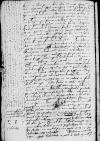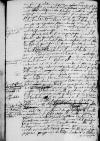Post ⌊⌋ meas satis prolixas, quas, utcumque fessus adhuc ex itinere male pinxi, accepi a meo ⌊⌋ et ⌊⌋ a nuntio Dominationis Vestrae Reverendissimae, ms 2 3 4 qui,
ms 1 q[ui] paper damaged⌈quims 2 3 4 qui,
ms 1 q[ui] paper damaged⌉ 1537-03-09⌊heri1537-03-09⌋ applicuit,
ex quibus mentem Dominationis Vestrae Reverendissimae, quemadmodum mihi visum est, plane intellexi. Quod in primis scribit se non parum
cf. Adagia 1526 No. 2930 Perplexus ⌊perplexamcf. Adagia 1526 No. 2930 Perplexus ⌋
moleste ferre interpretationem de indigenis nostris ⌊Cracoviae⌋ factam[1], iure quidem id ms 2 3 4 facit,
ms 1 fac[it] paper damaged⌈facitms 2 3 4 facit,
ms 1 fac[it] paper damaged⌉ Dominatio vestra Reverendissima, nollem tamen, ut hoc ipsum gravius, quam ms 2 3 4 oportet,
ms 1 oporte[t] paper damaged⌈oportetms 2 3 4 oportet,
ms 1 oporte[t] paper damaged⌉, in animum admitteret, quandoquidem communi ea in re habito consilio, quid responderi expediet et oporteat, Deo intellectum praestantes inveniemus.
In ⌊⌋ quod scribit Dominatio Vestra Reverendissima consultius fore, ut ⌊conventus futurus⌋ propter temporis angusti intercapedinem in ⌊Marienburgo⌋ loco solito relinquatur[2], minime reluctarer, si Dominatio Vestra Reverendissima certo posset adesse, cuius praesentia tum ms 2 3 4 maximopere,
ms 1 maxim[o]pere paper damaged⌈maximoperems 2 3 4 maximopere,
ms 1 maxim[o]pere paper damaged⌉ ⌊respublica nostra⌋ opus habitura est. Si vero res, ut nuper in ⌊Elbingo⌋, non succederet, nollem ego eam molem, quae nobis incumbit, in ⌊Marienburgo⌋ solus ms 2 3 4 ferre,
ms 1 fer[re] paper damaged⌈ferrems 2 3 4 ferre,
ms 1 fer[re] paper damaged⌉ – solus, inquam, sine Dominatione Vestra Reverendissima, cum multa eaque ms 2 3 4 ardua,
ms 1 a[r]dua paper damaged⌈arduams 2 3 4 ardua,
ms 1 a[r]dua paper damaged⌉ in rebus nostris publicis se offerent. Neque opinor dominos Polonos ad nos venturos[3] ⌊Thoroniam⌋ praetergressuros. Quicquid ea in re ⌊maiestas regia⌋ statuerit, ferendum est.
De litteris a ⌊maiestate regia⌋ ms 4 praemittendis,
ms 1 praemittendi[s] paper damaged,
ms 2 3 permittendis⌈praemittendisms 4 praemittendis,
ms 1 praemittendi[s] paper damaged,
ms 2 3 permittendis⌉, etiam si uno die, priusquam ⌊conventus⌋ celebretur, ms 2 3 4 nobilitati,
ms 1 nobili[ta]ti paper damaged⌈nobilitatims 2 3 4 nobilitati,
ms 1 nobili[ta]ti paper damaged⌉ et civibus reddantur, satisfactum putabo, cum prius sciant tempus ⌊futuri conventus⌋ et causas a ma(iesta)tibus paper damaged⌈[ibus]ibus paper damaged⌉ r(egiis) utrisque ⌊Cracoviae⌋ designatas. Ceterum, ut ms 2 3 4 locus,
ms 1 locu[s] paper damaged⌈locusms 2 3 4 locus,
ms 1 locu[s] paper damaged⌉ sciatur, necessarium esse arbitror. Ego me ms 2 3 4 velim,
ms 1 veli[m] paper damaged⌈velimms 2 3 4 velim,
ms 1 veli[m] paper damaged⌉ et a tempore et loco esse liberum, cum in nullum magis quam in me unum ... illegible⌈...... illegible⌉, si superinscribed⌈sisi superinscribed⌉ sine Dominatione Vestra Reverendissima praesum, omne odium et malorum hominum iniqua calumnia on the margin⌈omne odium et malorum hominum iniqua calumniaomne odium et malorum hominum iniqua calumnia on the margin⌉ conici soleat. Unde et me velim aegritudine ms 2 3 4 quapiam,
ms 1 quapia[m] paper damaged⌈quapiamms 2 3 4 quapiam,
ms 1 quapia[m] paper damaged⌉ praepediri, ut sine iis turbis ms 2 3 4 quoquomodo,
ms 1 quoquomo[do] paper damaged⌈quoquomodoms 2 3 4 quoquomodo,
ms 1 quoquomo[do] paper damaged⌉, quod vitae reliquum est mihi, transigere superinscribed in place of crossed-out vivere⌈viveretransigeretransigere superinscribed in place of crossed-out vivere⌉ liceret, utpote ms 2 3 4 non,
ms 1 n[on] paper damaged⌈nonms 2 3 4 non,
ms 1 n[on] paper damaged⌉ admodum vitae, cuius me saepe cepit taedium, avido ... illegible⌈...... illegible⌉ etc.
A domino ⌊Ioanne Czimmerman⌋ nullas accepi, quae si oblatae on the margin⌈oblataeoblatae on the margin⌉ ms 2 3 4 tempus,
ms 1 t[empus] paper damaged⌈tempusms 2 3 4 tempus,
ms 1 t[empus] paper damaged⌉, quo adiri debeam, a me postulaverint, non ms 2 3 4 gravate,
ms 1 grava[te] paper damaged⌈gravatems 2 3 4 gravate,
ms 1 grava[te] paper damaged⌉ praestabo. In articulis sic me geram, ut Dominatio Vestra Reverendissima consuluit superinscribed in place of crossed-out erit⌈erititit superinscribed in place of crossed-out erit⌉ atque voluit written over erit⌈erititit written over erit⌉.[4]
⌊⌋ a me Dominatio Vestra Reverendissima exemplum responsi nobilitati[5] a ⌊maiestate regia⌋ dati. Quod ex superinscribed⌈exex superinscribed⌉ ms 2 3 4 scripto,
ms 1 script[o] paper damaged⌈scriptoms 2 3 4 scripto,
ms 1 script[o] paper damaged⌉ non fuit prolatum, sed ⌊reverendissimus dominus Plocensis⌋ ex quibusdam annotatiunculis in margine nostrae consultationis[6], cuius Dominationi Vestrae Reverendissimae misi copiam superinscribed in place of crossed-out exemplum⌈exemplumcopiamcopiam superinscribed in place of crossed-out exemplum⌉, additis verbo dumtaxat a ⌊maiestate regia⌋ respondit, neque usu in aula regia receptum est, ut istiusmodi responsa scripto firmentur. Quae Dominationi Vestrae Reverendissimae scripsi ita, ut omnes audivimus, sic ea superinscribed⌈sic easic ea superinscribed⌉ in notitiam Dominationis Vestrae Reverendissimae deduxi. Ea, quae ⌊magnificus dominus palatinus Marienburgensis⌋[7] Dominationi Vestrae Reverendissimae misit, ad eum a domino ⌊Ioanne a Werden⌋ ex nostra omnino mente, ut ad Dominationem Vestram Reverendissimam perferrentur on the margin⌈ut ad Dominationem Vestram Reverendissimam perferrenturut ad Dominationem Vestram Reverendissimam perferrentur on the margin⌉, fuerunt missa.
De ⌊concilio⌋ nihil est quod boni sperare debeam. Fuit, ut prius scripsi,
⌊Cracoviae⌋ ⌊nuntius quidam ⌊pontificis⌋⌋[8], qui ad minimum tribus mensibus, priusquam certo concilium ⌊Mantuae⌋[9] constitui debuit, pollicitus est ⌊pontificem⌋ id ⌊Regni⌋ praelatis denuntiaturum. Quod hucusque neque successit, neque quando
succedere debeat, sciri potest superinscribed⌈sciri potestsciri potest superinscribed⌉ stantibus his inter ⌊caesarem⌋ et ⌊Gallum⌋ bellis, qui in Christianos omnem ⌊Turcarum⌋ vim induxit, cuius ad praesens non parva pars esse written over t⌈tsese written over t⌉ in ⌊Hungaria⌋ fertur, maxime autem in Germaniam on the margin⌈maxime autem in ⌊Germaniam⌋maxime autem in Germaniam on the margin⌉ inducere conatur.
Equos Reverendissimae Dominationis Vestrae ⌊hinc⌋ integros ad Dominationem Vestram Reverendissimam mitto cum summa, qua possum, gratiarum actione, atque utinam istiusmodi profectio numquam mihi ... illegible⌈...... illegible⌉ deinceps sit necessaria, a qua, quantum possum, cum damno factus cautior, me continebo in posterum. Hoc unum laudis a nostris nobilibus obtinui, quod dicor impensis ⌊Gdanensium⌋ hanc totam meam profectionem, in qua supra trium mensium spatium absumpsi et on the margin⌈in qua supra trium mensium superinscribed in place of crossed-out super tres menses⌈super tres mensesin qua supra trium mensiumin qua supra trium mensium superinscribed in place of crossed-out super tres menses⌉ spatium absumpsi etin qua supra trium mensium spatium absumpsi et on the margin⌉ in qua praeter decem equites (erant enim plures) superinscribed in place of crossed-out quinquaginta⌈quinquaginta(erant enim plures)(erant enim plures) superinscribed in place of crossed-out quinquaginta⌉ quadraginta equos alui, transegisse. Nihilominus tamen nulli quam Dominationi Vestrae Reverendissimae debeo, cui immensas ago gratias, quod adhuc pacientiam mecum habeat ... illegible⌈...... illegible⌉. Si eam pecuniam a fratre meo[10] Dominatio Vestra Reverendissima superinscribed⌈Dominatio Vestra ReverendissimaDominatio Vestra Reverendissima superinscribed⌉ accepisset, iam illam ⌊Fuggaris⌋, quibus ea satisfeci, deberem, neque illos frustrarer superinscribed in place of crossed-out essent brevi frustratos⌈essent brevi frustratosfrustrarerfrustrarer superinscribed in place of crossed-out essent brevi frustratos⌉, licet per duos annos sese subsequentes graves impensas fecerim. Nihilo secius tamen on the margin in place of crossed-out Et Deo gratia⌈Et Deo gratia[...] hidden by binding⌈[...][...] hidden by binding⌉ licet per duos annos sese subsequentes graves impensas fecerim. Nihilo secius tamen licet per duos annos sese subsequentes graves impensas fecerim. Nihilo secius tamen on the margin in place of crossed-out Et Deo gratia⌉, modo domi manere liceret superinscribed in place of crossed-out possem⌈possemliceretliceret superinscribed in place of crossed-out possem⌉, nihil mihi in gratia Dei deesset vel deesse posset. Dominus providebit on the margin⌈ms 2 3 4 Dominus,
ms 1 [Do](mi)nus⌈Dominusms 2 3 4 Dominus,
ms 1 [Do](mi)nus⌉ providebitDominus providebit on the margin⌉ etc.[11]
Sigillum maius datum est feria sexta ante Invocavit[12] ⌊reverendissimo domino Plocensi⌋, minus ⌊domino Iacob castellano Gostinensi⌋[13]. Copiam superinscribed in place of crossed-out s⌈smm superinscribed in place of crossed-out s⌉ litterarum ratione iuramenti, quas ⌊dominus palatinus Pomeraniae⌋ attulit, his ms 2 3 4 adiunctas,
ms 1 adiunctam⌈adiunctasms 2 3 4 adiunctas,
ms 1 adiunctam⌉ mitto. Quod reliquum est, me paterno Dominationis Vestrae Reverendissimae amori ex corde commendo Deumque precor, ut illam quam
diutissime sospitet prosperetque in omnibus.
 BCz, 244, p. 194
BCz, 244, p. 194
Reverendissime mi Domine. In scheda prioribus litteris, quas nuper nuntius meus attulit, inclusa ms. inclusis(!)
⌈inclusainclusa ms. inclusis(!)
⌉ scribit me lamentari et in cunctis meis litteris conqueri de impensis et molestia. Quae lamenta, si imprudens emisi, et querelae ne Dominationis Vestrae Reverendissimae animum offendant, oro. Non parum in rebus duris ferre solet leniminis, ubi tuto in sinus amici id, quod grave et onerosum est, effundere licet, etiam si ab amico nil speretur levaminis. Quantum
patriae debeam, non me praeterit, ad cuius commodum et honorem si quas feci graviores, quam forte oportebat, expensas, non ducor paenitudine, verum nostratium ingratitudine moveor, quod id honoris mihi non tribuant, quod de meis impenderim, sed, quasi ab aliis stipendio conductus, tam splendide et honeste cum principibus viris in aula regia convixerim. Neque me secus atque
cf. Ov. Tr. 3. (7) 42 Irus et est subito, qui modo Croesus erat; Prop. 3. 5. 17 Lydus Dulichio non distat Croesus ab Iro; Mart. 5. 39. 8-9 Croeso divitior licet fuissem, / Iro pauperior forem; Adagia 1526 No. 574, 576 ⌊⌊⌋ esse arbitrorcf. Ov. Tr. 3. (7) 42 Irus et est subito, qui modo Croesus erat; Prop. 3. 5. 17 Lydus Dulichio non distat Croesus ab Iro; Mart. 5. 39. 8-9 Croeso divitior licet fuissem, / Iro pauperior forem; Adagia 1526 No. 574, 576 ⌋, non excedens, quod ioco mihi Dominatio Vestra Reverendissima scripsit pro paroemia “vas du kanst, dos thu”[14], hunc modum hucusque in magnis rebus et expensis satis longo tempore versatus in debito servavi tenore servaturusque, porro pro paterna admonitione gratias habeo immensas, illamque et consilium Dominationis Vestrae Reverendissimae secutus sum in omnibus. Cui me iterum iterumque commendo.


 BCz, 244, p. 193
BCz, 244, p. 193